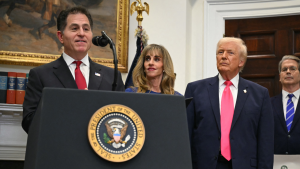Unlock the White House Watch newsletter for free
Your guide to what the 2024 US election means for Washington and the world
US philanthropies and non-profits groups focused on climate change fear that a potential loss of their tax-free status under the Trump administration could imperil their programmes.
Concerns have grown that the Trump administration is drafting an executive order on the eve of so-called Earth day next week that would have the effect of ending their tax-exempt status, as a logical next step to an order signed in January that targeted government “environmental justice” programmes and expenditures.
It also follows the dismantling of the US Agency for International Development (USAID) as well as other a swath of federal government activities related to dealing with climate change.
Multiple staff from US-based foundations and non-profits told the FT that they expected the Trump administration to end their tax exemptions for projects that involved spending overseas or were focused on climate or racial justice.
The likelihood has risen since President Trump threatened this week to remove Harvard’s tax exempt status.
Private foundations and charities, including many universities and churches, benefit from 501(c)3 status in the US tax code, which exempts them from paying some taxes and allows donors to claim a tax deduction on their contributions, but limits their political lobbying.
Some said they had begun to tweak language on their websites in the belief that government officials had been scanning philanthropic communications for mentions of climate change.
A staff member at a major US philanthropic group said that since January, they had tried to couch all climate work in terms of its relevance to food security, public health and economic growth.
“There is a group of people on Capitol Hill who don’t see climate as a threat and therefore think that it’s not worth using charitable dollars that get a tax benefit,” the person said.
The Ford Foundation, the Gates Foundation, the Rockefeller Foundation and the Bezos Earth Fund are among the US organisations that either have 501(c)3 status or receive donations from entities with that status, and have climate change related programmes, based on their latest filings.
Rajiv Shah, president of The Rockefeller Foundation, which has an endowment of about $6bn, said in a statement that the challenge it faced was how to “get back to basics.”
In March, the Bill Gates-funded Breakthrough Energy group made cuts to staff and budgets related to public policy on climate change, but said it remained committed to backing clean energy innovation. The Breakthrough Energy Foundation was granted tax-free status in 2021.
Last month, Don Gips resigned as head of the Skoll Foundation, which has assets worth more than $800mn, citing a “completely new world where many of the things that we and others in philanthropy built our strategies around have changed dramatically”, in a post on LinkedIn.
One person familiar with his thinking said he had been angered at a decision by Jeff Skoll, the founder, to “tone down” the foundation’s work on climate change, although he said “there is a rearguard action to protect climate work”. Skoll last year closed down Participant Media, his film-making company focused on progressive issues and bringing about social change.
Skoll, a former Democrat party funder, attended Trump’s inauguration and supported, in a February post on X, the idea of bringing USAID under state department control. Gips, who did not return calls from the FT, said in his post that he needed time to “explore strategic pivots” to help charitable foundations such as Skoll “navigate through this moment”.
The pressure on non-profits to go through communications with a fine-tooth comb comes even as they face growing calls for help following swingeing cuts to the USAID budget. One person close to a major US philanthropic group said: “We can’t fill the gap even if we liquidated our endowments.”
“It would be absolutely chilling,’ said Paul Paz y Miño, associate director at Amazon Watch, a California-based rainforest protection group founded in 1996. “Without non-profit status, without [the] ability to raise funds and resources, we can’t organise,” he said, saying any decision to revoke tax-free status would be part of a “multipronged approach to chill dissent”.
Read the full article here













